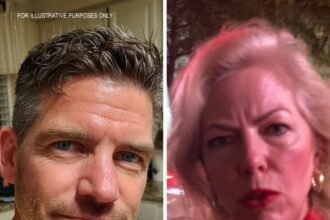⬇️⬇️
Continue reading below
nothing was happening. Svetlana didn’t cry. She simply stood up, wiped her face with a napkin, and left.
From that day on, the harassment began.
The phone rang every day—anonymous calls, whispers, threats:
“Leave while you still can.”
“We’ll tell everything.”
“You still have a chance to disappear.”
Then came the provocations: rumors that she was stealing, living off men, using drugs. One day, Yakov Ivanovich, an old neighbor, came up to her and said:
“People came to me. They offered money to sign a paper saying I saw you taking something from the storeroom.
I refused.”
He looked her straight in the eye:
“You’re a good person. And these—are scum. Stay strong.”
Svetlana stayed strong.
She didn’t tell Viktor. She didn’t want to ruin his last days before leaving for an internship in Europe. She hoped it would pass, that love would conquer all.
But not everything depended on her.
A few days before his departure, Viktor got a call from his father—Nikolai Borisovich Sidorov, the influential mayor of the city.
He summoned Svetlana to his office.
She arrived—dressed modestly but neatly. Sat across from him, straightened her back, as if before a trial. He looked at her with cold indifference.
“You don’t even understand what you’ve done,” he said.
“My son is our future. And you are a stain on his reputation. Leave voluntarily.
Or I will make sure you leave forever.”
Svetlana clenched her hands on her knees.
“I love him,” she quietly replied. “And he loves me.”
“Love?” Sidorov smirked. “That’s a luxury for equals.
And you—are not equal.”
She didn’t break. She left with her head held high. Didn’t say a word to Viktor.
Believing that the truth would find its way. But on the day of his departure, he left, knowing nothing.
A week later, the café owner—Stas—called her. A grim, always dissatisfied man.
He said there had been a shortage and that someone had seen her take something from the storage room. Svetlana was shocked. Then the police arrived.
The investigation began. Stas pointed at her. The others remained silent.
Those who knew the truth were afraid to speak.
The state lawyer was young, indifferent, and uninterested. In court, he spoke without conviction. The evidence was clearly fabricated.
The cameras didn’t capture anything, but the testimony of the “witnesses” was decisive. The mayor did his part. The verdict—three years in a general regime colony.
When the door of the cell closed behind her, Svetlana understood: it was all over.
What had been—love, hopes, dreams—was left behind bars.
And two weeks later, she began to feel nauseous. She went to the medical unit and took a test. The result was positive.
Pregnant.
From Viktor.
At first, the pain was unbearable. Then came emptiness. Then—the decision.
She would survive. For the child.
Pregnancy in prison was hell. They mocked her, humiliated her, but she didn’t respond.
At night, she would caress her belly, talk to the baby. She chose a name—Sasha. Alexander.
In honor of the protector. In honor of new life.
The birth was difficult, but the child was born healthy. When she took him in her arms, tears fell onto the blanket.
These were not tears of pain—they were tears of hope.
In the colony, two women helped her—one was serving time for murder, the other for theft. Both were tough, but they treated the baby with unexpected respect. They swaddled him, fed him, showed her how to soothe him.
Svetlana held on.
A year and a half later, she was released on parole.
On the outside, Yakov Ivanovich was waiting for her. In his hands was a worn-out baby envelope.
“Take it,” he said. “They returned this to you.
Let’s go. A new life awaits you.”
Sasha was sound asleep in the stroller, holding an old plush teddy bear to his chest.
Svetlana didn’t know how to thank him—for the chance to start over. And this chance came without warning, without pause.
From the very first day.
Each morning began at six: the son to daycare, she to cleaning at an office. Then car washes, and in the evening—a side job at a warehouse. At night—sewing machine, rags, threads.
She sewed aprons, napkins, pillowcases—everything she could sell or trade. The day flowed into the night, the night—into the day. It all seemed to happen through a haze.
Her body ached, she had almost no strength, but she moved as if wound up.
One day in the city, she ran into Larisa—a former café colleague. She froze when she saw her:
“My God… Is it really you? Are you alive?”
“Was there supposed to be any other option?” Svetlana replied calmly.
“Sorry… So many years have passed.
Stas went bankrupt, they kicked him out of the café. The mayor is in Moscow now. And Viktor… he got married.
They say he’s unhappy. He drinks.”
Svetlana listened, as if from afar. Something inside her stirred, but her face remained calm.
“Thank you for telling me,” she said.
“Good luck to you.”
And she walked on. Without crying, without hysterics. Only at night, when Sasha fell asleep, did she allow herself quiet tears—not from grief, but from the release of pain.
Sasha grew.
Svetlana did everything to give him a decent childhood: his first toys, a bright jacket, good food, a beautiful backpack. When he got sick—she didn’t leave his bedside, read him fairy tales, put compresses on him. When he fell and scraped his knee—she left her job at the car wash and ran to him, covered in soap and foam.
When he asked for a tablet—she sold the only thing left from her former life: a gold ring.
“Mom, why don’t you have a phone like everyone else?” he asked one day.
“I have enough with yours, Sasha,” she answered, smiling. “You are my most important call.”
He was used to his mom always being there, always ready, always smiling. Svetlana hid her exhaustion as best as she could.
She didn’t complain, didn’t allow herself to be weak, even when her legs refused to move.
Sasha grew into a confident, charming young man. He did well in school, and his friends appreciated him. But more and more, he said:
“Mom, buy yourself some decent clothes.
You can’t go on like this…”
She smiled:
“Okay, son, I’ll try.”
But inside, she felt a cold chill: does he… only see the poverty?
When he told her he was getting married, Svetlana hugged him, holding back tears:
“I’m so happy, Sasha! I’ll sew you a white shirt, okay?”
He nodded, as if he hadn’t heard.
Then came that conversation. Those words—“You’re a cleaner.
You’re a disgrace”—struck her heart like a knife. Svetlana sat for a long time before a photo of her son—a little boy, in blue overalls, with a radiant smile.
“I did everything for you, my baby,” she whispered. “Everything.
I lived for you. But it seems the time has come to live for myself.”
She stood up, walked to an old jar where she kept money “for a rainy day.” She counted it. Enough.
Not for luxury, but for a decent dress, a hairdresser, manicure. She made an appointment at a salon on the outskirts, chose simple makeup, a neat hairstyle. She bought a simple but elegant blue dress—it fit perfectly.
On the day of the wedding, she stood for a long time before the mirror.
Before her was a different woman—not worn out by life, but the one she once was. Svetlana carefully applied lipstick—for the first time in many years.
“Sasha,” she whispered, “today you will see me as I was. The one who was loved.”
At the registry office, everyone noticed her immediately.
Women stared, men involuntarily turned around. Svetlana walked slowly, her head held high, with a light but confident smile. In her eyes—no fear, no resentment.
Sasha didn’t recognize her at first.
When he realized—he turned pale. He approached, hissed:
“I told you—not to come!”
Svetlana gently leaned toward him:
“I didn’t come for you. I came for myself.
And I’ve already seen everything.”
She smiled at the bride—Dasha. She blushed but returned the greeting. Svetlana sat aside, not interfering, simply observing.
And when Sasha accidentally caught her gaze, something new flickered in his eyes—he saw her. Not as a background, not as an obligation, not as the past—but as a woman. And that was enough.
Later, at the restaurant, she sat a little away from the main crowd.
The chandelier, the music, the laughter—it all seemed to exist in another reality. She wore a blue dress, her hair neatly done, a calm expression on her face. She didn’t strive to be the center of attention, didn’t look for excuses.
Her inner silence was stronger than any celebration.
Next to Sasha was Dasha. Sweet, open, with a warm smile. In her eyes, there was no disdain—only interest and, strangely, admiration.
“You’re so beautiful,” she said softly.
“Thank you for coming. I’m really glad to see you.”
Svetlana responded with a smile:
“This is your day, dear. May it be filled with much happiness.
And patience too.”
Dasha’s father approached—a distinguished man with a confident posture. He bowed politely:
“Join us at the table. We’ll be very glad.”
Sasha remained silent.
He watched as his mother, without a single reproach, accepted the invitation and walked with dignity toward new people. He didn’t have time to object—it was already happening by itself. It was as if she had stepped out of his control, out of the shadow he had once put her in.
It was time for the toasts.
Guests were talking, laughing, telling stories. Then the room fell silent—someone noticed Svetlana standing up. Everyone turned to look.
“If you’ll allow me,” she said quietly but clearly, “I’d like to say a few words.”
Sasha tensed.
But she had already taken the microphone, calm and composed, as if it wasn’t the first time in her life.
“I won’t speak for long. I want to wish you love. The real kind, the one that gives you strength when you’re weak.
The one that doesn’t ask about the past. The love that just exists. Take care of each other.
Always.”
She didn’t cry. But her voice trembled—just a little. The room was silent.
It wasn’t just a speech—it was a strike of truth, one that couldn’t be ignored.
Then applause broke out. Honest. Genuine.
Svetlana returned to her seat, lowering her gaze.
And at that moment, a figure appeared next to her. A shadow fell on the tablecloth. She looked up—and saw him.
Viktor.
A little older now, with some gray, but still with that same light in his eyes. His voice was just as familiar:
“Svet… Is it really you?”
She stood up. Her heart beat fast, but she didn’t let herself break.
“You…”
“I don’t even know what to say.
I thought you left.”
“And you got married,” she said calmly.
“They told me you disappeared, that you were with someone else. I searched for you, but my father… he did everything to make sure I didn’t believe you.”
They stood facing each other, like two people between whom—years of pain, oblivion, and silence. Viktor extended his hand:
“Shall we talk?”
They stepped out into the hallway.
Svetlana walked slowly, but she didn’t tremble. She was no longer the girl who had been humiliated. Now—she was a woman who had survived hell and lived through it.
“I had a child,” she said.
“While I was in prison. From you. And I raised him.
Without you.”
Viktor closed his eyes. Something inside him broke.
“Where is he?”
“Over there, in the hall. At the wedding.”
The man turned pale.
“Sasha?”
“Yes.
He’s our son.”
A pause. Just footsteps on the cold floor and the muffled sound of music from the hall.
“I have to see him. Talk to him.”
“He’s not ready yet,” Svetlana replied.
“But one day, he will see. That’s it. I’m not holding a grudge.
It’s just… everything is different now.”
They returned to the hall. Viktor offered her to dance. A waltz.
Light, almost weightless. They spun around, and the guests watched. Sasha stood, unmoving.
He didn’t understand: who was this man? Why did mom look like she belonged in this world? Why was everyone looking at her, not him?
And for the first time in his life, he felt ashamed.
Ashamed of every word he had said, of his indifference, of the years he had spent thinking he knew everything. Ashamed that he hadn’t seen her—truly.
When the music stopped, he approached his mother:
“Mom… Wait… Who is this?”
Svetlana looked him in the eyes. Smiled—not with bitterness, but with warmth, where pain and understanding mixed.
“This is Viktor.
Your father.”
Sasha froze. The surrounding world felt distant, as if underwater. He shifted his gaze from one to the other.
“You… serious?”
“Very.”
Viktor stepped forward:
“Hi, Sasha.
I’m Viktor.”
Silence. No one said a word. Just looks.
Just the truth hanging in the air.
“To the three of us,” Svetlana said, “we have a long and difficult conversation ahead.”
And they walked out together. Not loudly, not theatrically. Simply—beginning a new life.
Without lies. Without past hurts. With the truth.
And, perhaps, with forgiveness.




